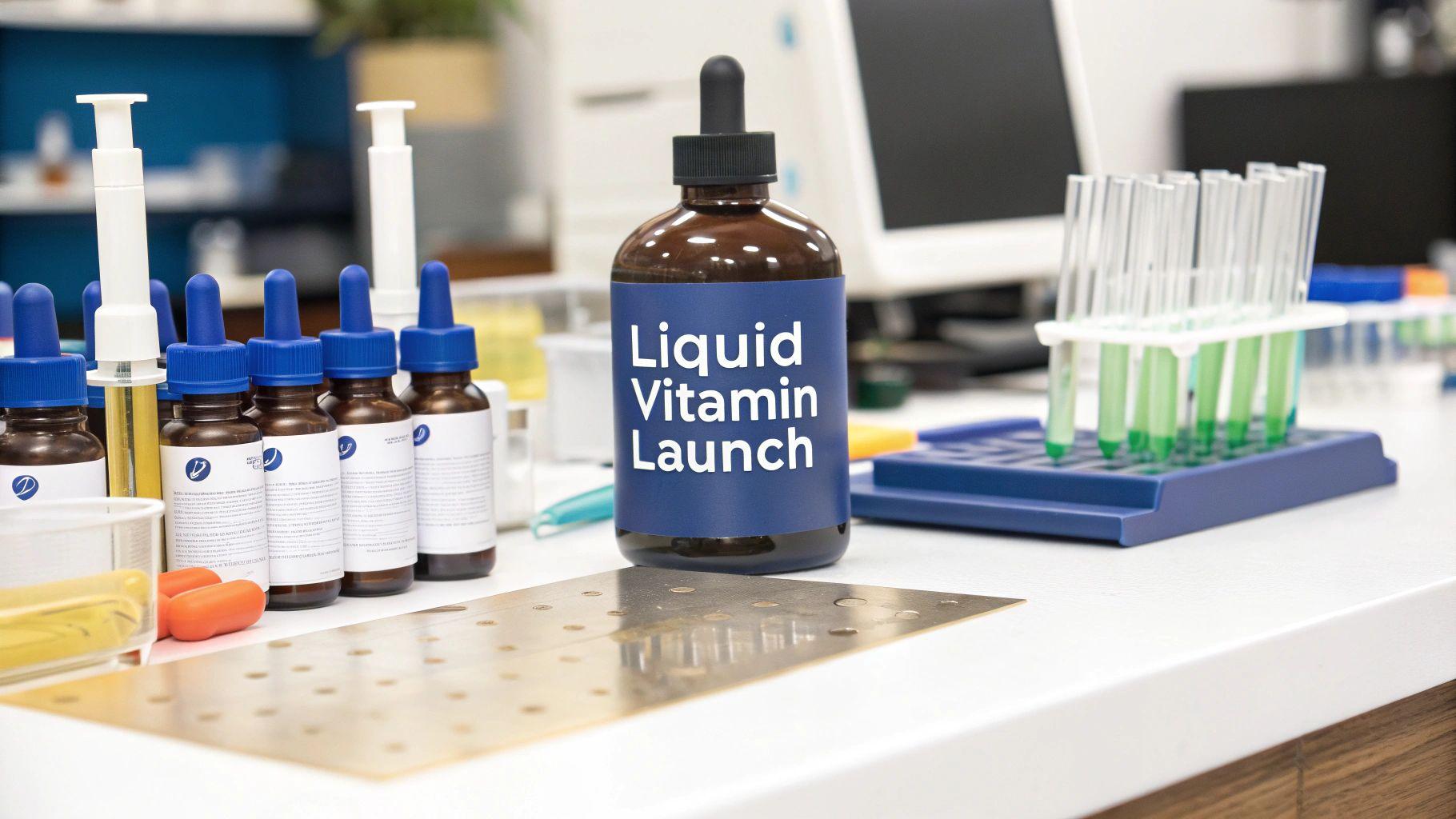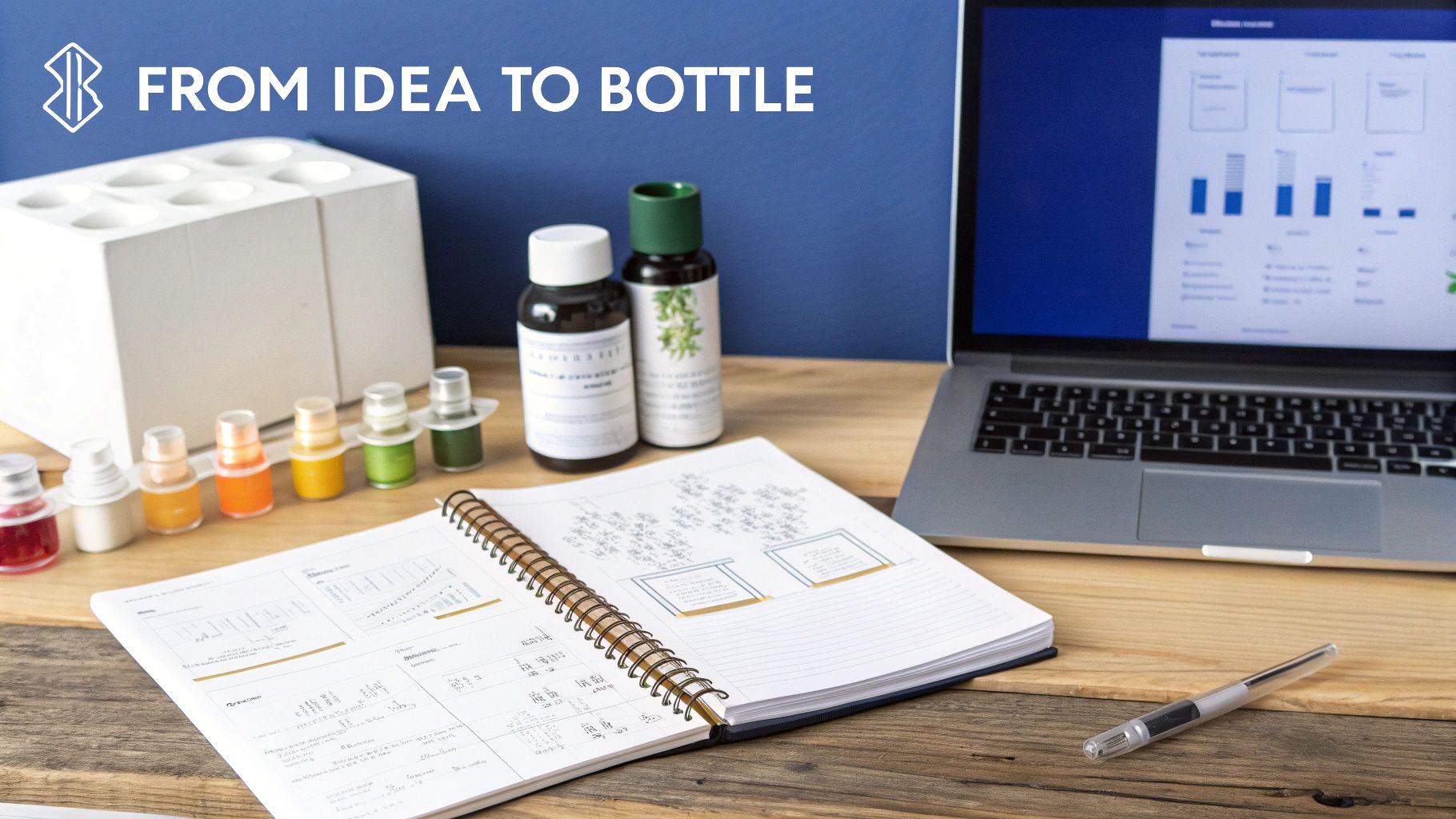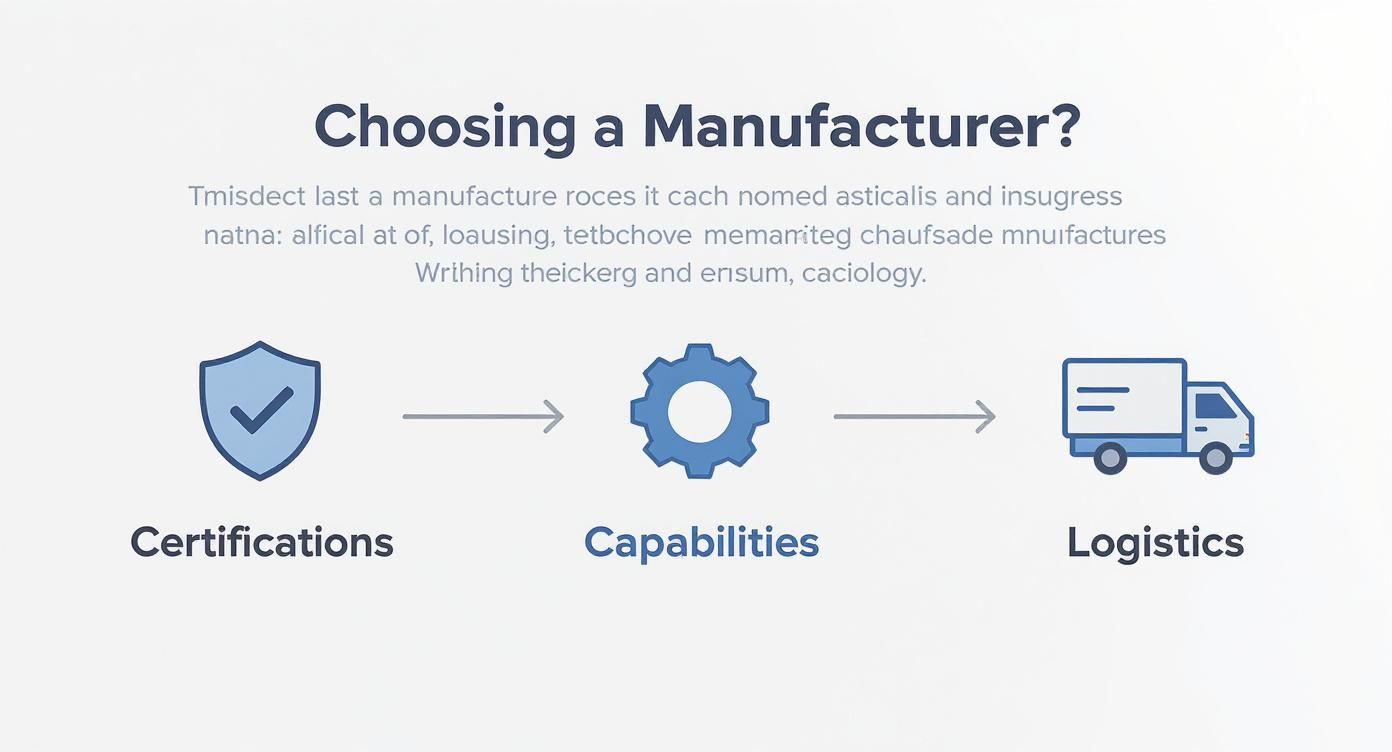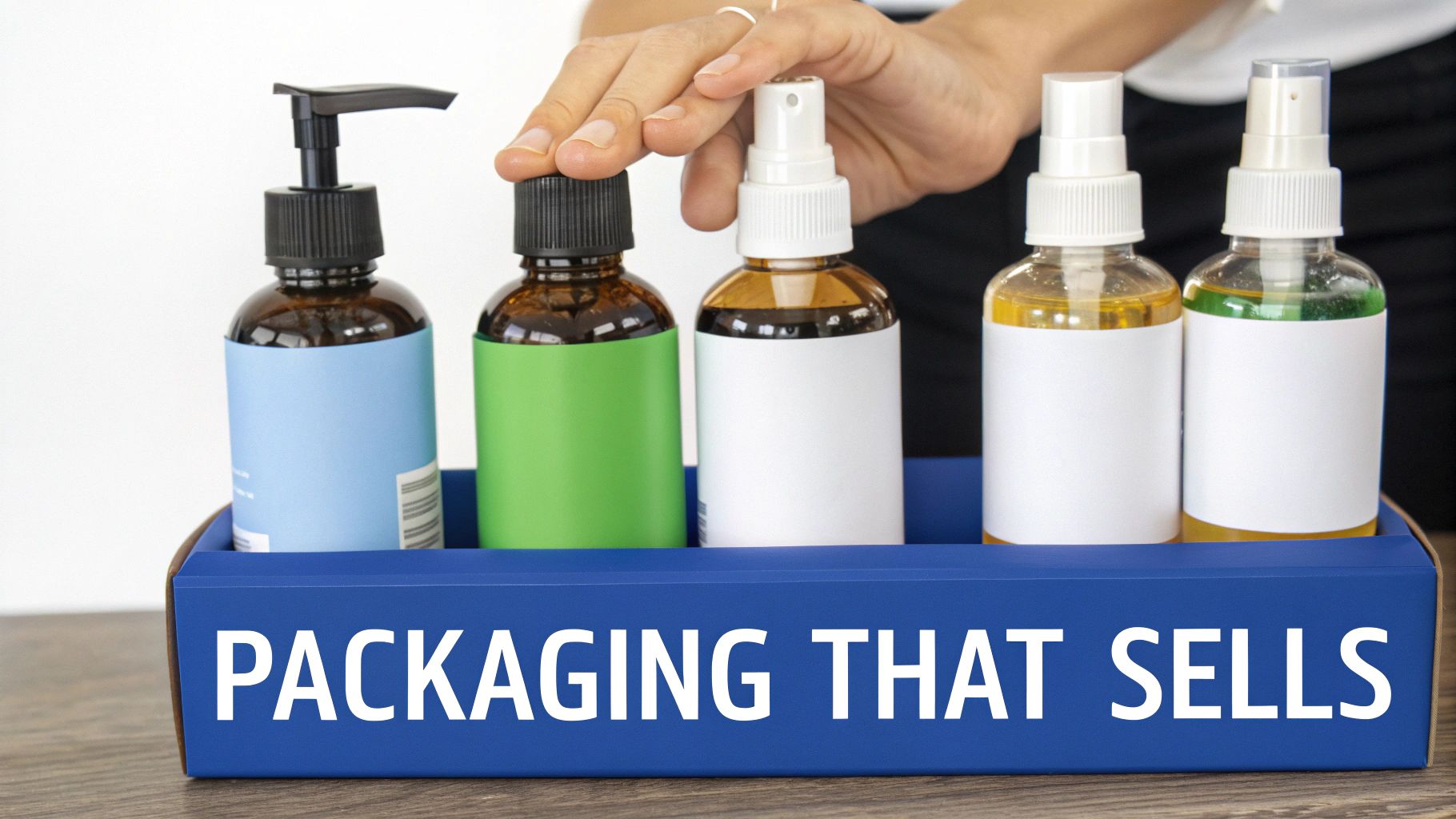Your Guide to Launching Private Label Liquid Vitamins
Your expert guide to private label liquid vitamins. Learn how to navigate formulation, manufacturing, and marketing to launch a successful supplement brand.
 Get a Free Quote Today!
Get a Free Quote Today!Launching a brand in the competitive supplement space can feel daunting. But private label liquid vitamins offer a strategic entry point. This model allows you to bypass the immense cost and complexity of building a manufacturing facility from the ground up. Instead, you can place your own brand on a professionally formulated product, giving you a faster, more affordable path into the booming wellness industry.
Why Liquid Vitamins Are a Smart Brand Move
The market for liquid supplements isn't just growing; it's accelerating. Today’s consumers are actively seeking effective alternatives to traditional pills, creating a massive opportunity for forward-thinking brands. This guide provides a practical, no-fluff roadmap for launching your own private label liquid vitamin line.
Success in this niche comes down to three core pillars: unwavering quality, deep customization, and a genuine partnership with your manufacturer. As your collaborative partner, we help you master these elements to transform your brand vision into a product that connects with customers and drives loyalty.
The Undeniable Market Shift
The numbers tell a clear story. The liquid vitamins market is already valued at approximately US$26.1 billion and is projected to reach US$34.87 billion by 2029. This isn't a fleeting trend; it’s a fundamental shift in consumer preference. To explore the data further, you can review the full liquid vitamins global market report.
This growth is fueled by the tangible advantages liquid formulas offer—advantages that are becoming deal-breakers for health-conscious shoppers.
Entering the private label liquid vitamin space means meeting a clear, data-backed consumer demand. You're offering nutritional products that are more effective, more convenient, and better suited to modern lifestyles.
Key Advantages Driving Consumer Demand
To build a brand that resonates, you must understand why consumers are choosing liquids. It’s about communicating real benefits that solve their problems.
What’s behind this shift?
- Superior Bioavailability: Because they are already in a dissolved state, liquid supplements are absorbed faster and more efficiently by the body. There's no pill to break down, which is a powerful selling point for effectiveness.
- Enhanced User Experience: A staggering 40% of American adults report difficulty swallowing pills. For this large demographic, liquid supplements are a welcome relief. "Pill fatigue" is a significant driver of this market.
- Flexible and Precise Dosing: A simple dropper or measuring cap allows users to easily customize their dose. This is ideal for children, older adults, or anyone requiring a specific amount that a standard capsule can't provide.
- Innovative Flavor Possibilities: Forget chalky or unpleasant tastes. We leverage advanced flavoring technology to create supplements that are genuinely enjoyable. Transforming a daily chore into a pleasant ritual builds incredible customer loyalty.
Let’s see how liquids stack up against traditional pills.
Why Liquid Vitamins Are Winning Over Consumers
This quick comparison highlights the key advantages liquid supplements offer, helping you understand the core value proposition for your brand.
| Attribute | Liquid Vitamins | Traditional Pills/Capsules |
|---|---|---|
| Absorption Speed | Fast; nutrients are readily available | Slower; requires breakdown in the digestive system |
| Bioavailability | High; greater percentage of nutrients are absorbed | Lower; binders and fillers can impede absorption |
| Ease of Use | Simple to swallow, great for all ages | Difficult for the ~40% of adults with swallowing issues |
| Dosing Flexibility | Highly customizable with droppers or caps | Fixed dosage, difficult to adjust |
| Flavor Profile | Excellent; can be made into enjoyable flavors | Often unpleasant or neutral at best |
| Pill Fatigue | The perfect solution to consumer pill fatigue | A primary cause of "pill fatigue" and non-compliance |
These benefits represent a fundamental improvement in the user experience—exactly what modern consumers demand.
Turning Your Product Idea Into a Reality

Every great supplement begins with an idea aimed at solving a specific problem. But the idea is just the start. The real challenge is transforming that concept into a safe, effective, and scalable product. This is where your vision meets the science of formulation.
Success begins with a well-defined niche. A generic "multivitamin" gets lost in a crowded market. Get specific. Think about formulas that serve a distinct audience: a cognitive blend for gamers, an energy-boosting tincture for busy parents, or a plant-based iron supplement for vegan athletes.
To understand how top brands dominate their categories, it’s helpful to research the broader landscape of Amazon private label products.
Choosing Your Formulation Path
Once you’ve defined your target audience, you face a key decision: use a proven stock formula for speed-to-market, or develop a custom formula to create a unique product? The right choice depends on your goals, budget, and timeline.
-
Stock Formulas (White Label): These are pre-developed, market-tested formulations. The primary advantage is speed. You can launch a product in a fraction of the time, often with lower minimum order quantities (MOQs). This is an excellent strategy for testing a new market or launching your first product with minimal risk.
-
Custom Formulas (Private Label): This is the from-scratch approach. You control every ingredient, dosage, and flavor note. While it's a more involved process, the result is a proprietary product that competitors cannot replicate. This is how you build a defensible, long-term brand in the private label liquid vitamins space.
Your manufacturer should be more than a supplier; they are your R&D partner from concept through launch. A true partner helps you weigh the benefits of speed versus uniqueness to create a product that perfectly aligns with your brand vision.
From Concept to Concrete Specification
This is where your idea becomes a technical spec sheet. It's a deeply collaborative process focused on the critical details: ingredient efficacy, nutrient synergy, flavor profiling, and shelf-life stability. This is where we leverage innovation, like advances in botanical extraction, to maximize your formula's potency.
This stage also positions you to capitalize on a massive wave of consumer demand. The liquid dietary supplements market is set to expand from US$23.45 billion to an incredible US$54.50 billion by 2034, driven by the demand for fast absorption and convenience. Understanding the rise of liquid dietary supplements highlights the immense opportunity.
The goal here is to create a bulletproof blueprint for your product. You’ll finalize the formula, lock in the flavor, and gain a clear understanding of the manufacturing process, ensuring a smooth transition to full-scale production.
How to Choose the Right Manufacturing Partner
Selecting a manufacturer is the single most important decision you will make. You aren't just finding a vendor to fill bottles; you are choosing a long-term partner who will function as an extension of your brand. Their quality, expertise, and reliability directly impact your product's success and your company's reputation.
A great partner acts as your outsourced R&D team, quality control department, and production floor. They collaborate, bringing innovative ideas on formulation and flavoring to the table. This partnership mindset is the key to a smooth, scalable launch.
Vetting for Quality and Compliance
Before discussing pricing, you must verify a potential partner's commitment to quality. Their certifications are your first line of defense, proving your product will be safe, pure, and potent.
- cGMP (Current Good Manufacturing Practices): This is the FDA's gold standard and is non-negotiable. It ensures meticulous, documented procedures for every step, from raw material handling to final product testing. This guarantees consistency and quality in every batch.
- UL Certified: An independent audit from a globally recognized body like UL adds a powerful layer of trust. It confirms the facility meets rigorous safety and quality standards, giving you and your customers peace of mind.
- FDA-Registered Facility: This is the baseline requirement. It signifies that the manufacturer operates under the direct oversight of the Food and Drug Administration, demonstrating accountability to the industry's highest regulatory authority.
A manufacturer's certifications aren't just paperwork; they are your brand's insurance policy. They safeguard you from regulatory issues, build crucial consumer trust, and signal your serious commitment to your customers' health.
Assessing Capabilities and Flexibility
After confirming quality and compliance, ensure they have the operational setup to bring your vision to life. Ask about their production technology. For example, we utilize a cold-fill process, which is critical for protecting heat-sensitive nutrients and botanicals and ensuring your final product retains maximum potency.
Equally important is their operational flexibility. You need a partner who can support you from pilot run to full-scale production.
- Minimum Order Quantities (MOQs): Can they accommodate a small pilot run of 1,000–1,500 units? This flexibility is essential for testing the market without a massive upfront investment. A partner who only accepts large orders is not a good fit for a new brand.
- Scalability: As your brand grows, can they scale up to tens of thousands of units without compromising quality or extending lead times? You need a partner equipped for your future success, not just your initial launch. Our rapid turnaround times and transparent timelines are designed to support your growth.
Choosing the right manufacturing partner is a crucial process. To help you dive deeper, we’ve put together a comprehensive resource on how to find the ultimate liquid supplement manufacturer.
Mastering Quality Control and FDA Compliance
For a private label liquid vitamin brand, quality is the foundation of customer trust. Navigating regulations can seem complex, but with a transparent quality control process, compliance becomes a powerful marketing tool. It’s how you prove that what's on the label is exactly what's in the bottle—every time.
This commitment to quality begins long before bottling. We start with a rigorous vetting process for raw ingredients. Every botanical, mineral, and vitamin is tested for identity, purity, and potency before it enters our facility. This proactive approach prevents issues later and builds your product on a verified foundation.
From Raw Materials to Final Verification
Once ingredients are approved, our quality control continues with in-process checks. We constantly monitor critical factors like temperature and viscosity to ensure nutrients are evenly distributed throughout the production run. This continuous feedback loop guarantees consistency from the first bottle to the last.
The final, mandatory step is third-party lab testing. While our in-house labs perform exhaustive checks, we send a sample from every batch to an independent facility for unbiased analysis. This provides you with a Certificate of Analysis (CoA)—your definitive proof that the product meets all specifications for purity and potency. The CoA protects your brand and builds unshakeable confidence with your customers.
This infographic breaks down what to look for in a manufacturing partner, hitting on the key checkpoints like certifications, capabilities, and logistics.

A robust quality framework is a multi-stage process, ensuring excellence from sourcing through final delivery.
Making Compliant and Compelling Claims
Beyond the formula, FDA compliance extends to every word on your packaging and marketing materials. Your label must be both appealing and legally sound. This means understanding the difference between promoting a benefit and making an illegal health claim.
Key Takeaway: You can make "structure/function" claims describing how a nutrient supports the body's normal functions (e.g., "Calcium supports strong bones"). You absolutely cannot claim your product will diagnose, treat, cure, or prevent any disease.
Getting this right is critical for avoiding regulatory trouble and building a credible brand.
Working with a manufacturing partner who knows these nuances is a significant advantage. It allows you to market your private label liquid vitamins both effectively and safely, ensuring your product is not just pure and potent, but also 100% compliant.
Creating Packaging That Sells Your Brand

While the formula is the core of your product, the packaging is the soul of your brand. In a crowded marketplace, your bottle is often your only chance to make a connection with a customer. It's more than a container; it's a critical marketing tool that must communicate quality, build trust, and tell your brand story at a glance.
This is especially true today, as consumers seek personalized health solutions. The global personalized vitamins market, where private label liquid vitamins are thriving, is expected to grow from US$5.4 billion to US$12.9 billion by 2032. This explosive growth confirms that connecting with a niche audience is everything. You can dive into the full report on personalized vitamin market trends to see the opportunity for yourself.
Choosing the Right Materials and Dispenser
Your first decision is a functional one: which material will best protect your formula and enhance the customer experience? We offer flexibility in packaging to meet your brand's specific needs.
- Amber Glass: The gold standard for protecting sensitive botanicals and vitamins from UV light degradation. It offers a premium feel and is infinitely recyclable—a key selling point for eco-conscious consumers.
- PET Plastic: A durable and lightweight option. PET bottles are shatterproof and can be more cost-effective to ship. They offer significant design flexibility, making them ideal for brands targeting active lifestyles or families.
Next, consider the daily user experience. A calibrated dropper offers precision for potent formulas, while a pump provides no-fuss convenience for a daily multivitamin. The right dispenser can turn product use into a positive daily ritual.
Your packaging is an extension of the product itself. A frustrating dropper or a leaky cap can undermine the perceived quality of even the best formula. The goal is a seamless, positive daily ritual for your customer.
Designing a Label That Is Compliant and Compelling
Your label design must balance grabbing attention with adhering to strict FDA regulations. Your logo, color palette, and typography should instantly communicate your brand's personality. Whether you're science-backed and precise or natural and holistic, your design must tell that story.
This creativity must exist within a rigid regulatory framework. Every element, from the supplement facts panel to the net quantity of contents, must be perfectly compliant. Partnering with an experienced manufacturer is a game-changer here. We help you create a design that not only sells but also meets every legal requirement.
Your Go-To-Market and Growth Strategy
You’ve perfected the formula and your packaging is ready. Now it’s time to get your private label liquid vitamins into the hands of customers. A strategic go-to-market plan is what transforms inventory into a thriving, revenue-generating brand.
The first step is choosing your sales channels. Will you build a direct-to-consumer (DTC) brand on a platform like Shopify, where you own the customer relationship? Or will you leverage the massive audience of a marketplace like Amazon FBA? Some brands find success by partnering with practitioner networks, building credibility through professional endorsements.
Fulfillment and Initial Marketing
Once you know where you’ll sell, you need a plan for how you'll deliver.
In-house fulfillment offers control but comes with significant overhead. A third-party logistics (3PL) provider can offload picking, packing, and shipping. For a truly hands-off approach, you can explore a dropshipping program with your manufacturer, freeing you to focus entirely on marketing and brand building.
Marketing is about creating a sustainable growth engine. It's crucial to understand making your products visible in an AI-powered world, as search and discovery algorithms are rapidly evolving.
For your launch, focus on high-impact tactics:
- Targeted social media ads on platforms where your ideal customers gather.
- Influencer collaborations with trusted voices in your specific wellness niche.
- Content marketing that educates your audience on the benefits of liquid supplements, establishing you as an expert.
Your launch is the starting line, not the finish. Treat it as the beginning of a continuous feedback loop. Use customer reviews and data to refine your messaging, improve your product, and plan your next move. This process of listening and adapting, supported by a reliable and speedy manufacturing partner, is the secret to scalable success.
Common Questions About Launching Liquid Vitamins
As an industry insider, we understand you have questions. We believe in providing clear, direct answers to help you navigate the process with confidence. Here are a few of the most common queries we receive from brand builders like you.
Timelines and Investment
What's a realistic timeframe to launch a private label liquid vitamin?
The timeline depends on complexity. For a straightforward launch using one of our market-tested stock formulas, we can get you to market in as little as 6-8 weeks, thanks to our commitment to rapid turnaround and reliability.
A fully custom formula requiring unique ingredient sourcing, stability testing, and bespoke packaging is a longer journey, typically in the 4-6 month range. We provide a transparent project timeline from the outset, so you have clear expectations.
So, how much does it cost to start my own vitamin line?
Your initial investment depends on your formula's complexity, ingredient costs, packaging choices, and Minimum Order Quantity (MOQ).
A stock formula generally has a lower barrier to entry, with flexible MOQs starting around 1,000 to 1,500 units. A complex custom blend may require a larger initial run. It's important to budget for production, formulation, packaging, and third-party testing. We always recommend getting a detailed quote based on your specific concept.
Formulation and Sourcing
Can I bring my own ingredients for a custom formula?
While possible, this often introduces significant complexity and delays. As a cGMP and UL-certified facility, we operate under a strict raw material qualification program.
Any new supplier must undergo this same rigorous vetting process to meet our quality and safety standards. This step adds both time and cost to your project.
It's almost always faster and more reliable to leverage your manufacturer's network of pre-qualified, trusted suppliers. This ensures your private label liquid vitamins are made with verified, high-purity ingredients without disrupting the production schedule.
Ready to turn your vision for a standout liquid supplement brand into a market-ready reality? As your R&D partner from concept through launch, Triton Nutra Group is here to guide you every step of the way. Request a quote today and let's start the conversation.